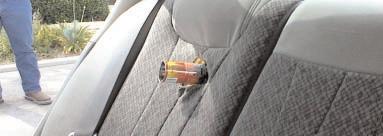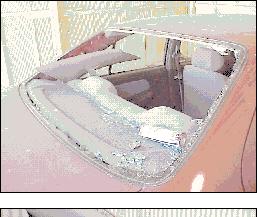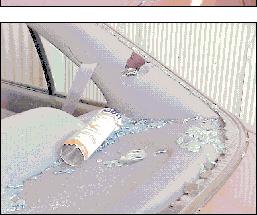
12 minute read
Business Manager’s Report
Peter Jackson Combined Gas Systems 13 Brookfield Road Culcheth Warrington Cheshire WA3 4PB
Wayne F Martin 42 Panton Road Hoole Chester CH2 3AH
Advertisement
Martin Morrell Grain House The Maltings Station Road Alne North Yorkshire Y061 1TP
Amanda Niven Falkirk Council Development Services Abbotsford House David's Loan Bainsford Falkirk FK2 7YZ
Alan Stevenson Alan Stevenson Associates Ltd 63 Bevendean Crescent Brighton BN2 4RB
News
UK, Norfolk - Major road closed as tanker overturns November 10, 2003
Firefighters and environmental officers averted a major safety hazard after a fuel tanker overturned on the A140, leaking petrol and diesel into nearby waterways.
Just before midnight on Saturday a lorry containing more than 40,000 litres of fuel toppled on a roundabout at Dickleburgh, blocking the northbound carriageway.
The road remained blocked the following day as the containment and clean-up operation continued until 4pm, involving dozens of firefighters from all over Norfolk as well as officers from the Environment Agency and South Norfolk District Council. Traffic was diverted through the village of Dickleburgh.
Makeshift sand dams were built in roadside ditches to prevent the spilled fuel contaminating rivers and a bed of foam was sprayed around the lorry to Ken Wales AJ Cunnigham Ltd t/a William Skinner Cunnigham House Highfield St Quivox Ayr KA6 5HQ
Gregg Walker Statcourt Service 31 Portland Place Fauld House West Lothian EH47 9D
Edward Wheeler Eurotank Environmental Ltd Unit 10, Saxon Wharf Lower York Street Southampton SO14 5QF
Michael Whiting Martindales 1 Avro Court Ermine Business Park Huntingdon Cambs PE29 6WE
Vigh-Bellon Zsolt ACIS - Advanced Construction Ind Services Gyàr u.2. Budaörs Pest 2040 Hungary
December
Colin Maxwell Suffolk County Council Trading Standards Dept St Edmund House Rope Walk Ipwich Suffolk IP4 1LZ
Matthew Sullivan 11 Highfield Road Bromsgrove Worcester B61 7BD
Paul Grayling 18 Cordys Lane Trimley St Mary Felixstowe Suffolk IP11 0UD
Iain Thompson Avon Fire Brigade Avon Fire Brigade H/Q Temple Back Bristol BS1 6EU
minimise the risk of fumes igniting.
Power was cut to nearby lampposts after the truck knocked one to the floor, leaving wiring exposed, and the remaining fuel was transferred to a second tanker to be removed from the crash site.
Leading firefighter Phil Leeder said: "The potential for something to go wrong was quite high. We has two primary concerns. One was the risk of fire from fuel leaking from the tanker and the other was the environmental impact. The Highways Agency brought sand and we put dams in the ditch both sides of the lorry to contain the spill. The Environment Agency worked to clean up the itches and skimmed fuel from the surface of the water. We needed specialist equipment to decant the fuel from one tanker to the other and two lorries, one with a crane, to right the tanker and take it away."
Bridget Marr of the Environment Agency said: "We are very hopeful that this spill has been contained successfully and quickly enough to prevent any major impact. Only a very short stretch of water has been affected."
Chris Tubby said special absorbent booms were used alongside the sand dams to contain the spill in the ditch. "Compared to what could have happened we have a very small spill and the fire service have been excellent in preventing fire and helping us to contain the spillage."
UK, Hazard Bulletin Beware of Aerosol Cans
Do you keep WD-40, hair spray, Off, Fix-A-Flat, etc. in your vehicle? If so, you might want to reconsider.
The picture on the next page is of a pressurized can that exploded in a person's vehicle and imbedded itself in the back seat of the car. The temperature outside of the closed up vehicle was about 100 degrees F. What if you or a loved one had been sitting in that seat? Do any of your family members keep aerosol cans in their vehicles? If they do, please pass this warning along to them!
The incident pictured happened at a refinery in Beaumont. A deodorant
spray can was left in the back of the vehicle that was parked in an open space in the middle of a hot, sunny day.
Without warning, the can exploded inside the car. Fortunately, no one was inside or near the car when it happened.

Lesson:
• Do NOTleave pressurized containers (of any kind) in your vehicle where they can be exposed to sunlight!
• You should always read and follow the manufacturer's safety recommendations that come with the can. • Reporting incidents such as this can help inform personnel of possible risks and dangers both inside and outside the workplace!

UK, How do we deter employers from breaching health and safety if not through proper action and tougher fines?
"More enforcement action in higher risk industries through the Health and Safety Executive's (HSE) more targeted inspection regime, aims to reduce instances of ill-health, serious injuries and needless fatalities. Why then do general levels of fines - the foremost deterrent - remain too low to deter companies from committing more serious breaches?" asks Timothy Walker, Director General of the Health and Safety Executive.
Prompted by the disappointing levels of fines published today in HSE's fourth annual Offences and Penalties report, Mr Walker continued, "it is incomprehensible that fines for especially serious big company breaches in health and safety are only a small percentage of those fines handed down for breaches of financial services in similarly large firms. I understand that financial service breaches can affect people's wealth and well-being, but breaches in health and safety can, and do, result in loss of limbs, livelihoods and lives." Mr Walker went on to add: "We said last year that we hoped the increase in last year's fines was the start of an upward trend, but this has sadly not been the case. There has been no substantial change to reflect the seriousness of health and safety cases since the Court of Appeal said in 1998 that fines for health and safety were too low." The HSE's Offences and Penalties report provides details of enforcement action for 2002/03 and shows that 933 companies, organisations and individuals were convicted of health and safety offences.
HSE targets its efforts on those risks and industry sectors that give rise to most injuries, instances of ill-health and deaths. Enforcement has an important part to play and the most serious breaches face the toughest action.
HSE issued a much larger number of improvement and prohibition notices in agriculture and construction this year two of the Commission's priorities due to previously poor records in preventing accidents and controlling risks. This shows the determination of HSE inspectors to bring about improvements in the way serious risks are managed.
The average fine for health and safety cases across the UK fell by 21 per cent, from £11,141 in 2001/02 to £8,828 in 2002/03 - partly because there were fewer of the larger fines. Speaking of the work of the HSE, Mr Walker commented, "the report shows the special attention HSE inspectors give to preventing serious risks in industries with poor records. Much of what HSE does is aimed at prevention, but enforcement has an essential part to play. In especially serious breaches, HSE will prosecute."
The Health and Safety Commission (HSC) Chair Bill Callaghan said, "the Government and HSC have set ambitious targets in the Revitalising Health and Safety strategy - designed to cut injuries, ill-health and deaths, by promoting partnerships with employers and others. The marked increase in improvement and prohibition notices shows HSE is pursuing the Commission's targets, which aim at preventing accidents and ill-health. However, society is poorly served, by inadequate fines that fail to mark the seriousness of health and safety convictions. Above all it is unfair to the businesses that are managing risks and safeguarding the health and safety of their workforce."
Acopy of the Offences and Penalties report can be downloaded from the HSE website at: http://www.hse.gov.uk/enforce/off0203.pdf
UK, Guidance for HSE staff: Operational circulars and operational minutes
Operational Circulars (OCs) and Operational Minutes (OMs) provide guidance on inspection and enforcement for HSE's inspectors. Although they have been produced mainly for internal use within HSE, it is felt that such information may also be of interest to people outside HSE.
However, we do not know whether the level of demand outside HSE warrants making the full text of these documents available upon HSE's website or whether it is more cost effective to make a list of titles available with the option to request electronic or paper copies as necessary. Therefore, for a trial period of 3 months (until end January 2004), HSE is making available a list of titles of all OCs and OMs that have been issued during 2002 and 2003 and that are still current. The results from this trial will determine whether we continue to provide a list of titles (and extend it to all current titles) or whether we proceed to make
available the full text documents.
Whilst HSE's policy is to be as open as possible, not all information can be made available to the public. Some of the documents listed below contain exempted information. Where this is the case, we will supply you with a copy of the document with the exempted information removed. In such cases we will indicate where information has been withheld and the relevant exemption that has been applied. For more information on exempted information, please visit HSE’s Publication Scheme at www.hse.gov.uk/publish.
Please note that some of these documents may refer to earlier OCs and OMs as well as other documents that have not been included in this trial.
Should you find this to be the case when you receive your requested document(s), and you wish to see a copy of the other document(s), please contact Kate McNichol, details below, to arrange for copies to be supplied or to advise you on how to obtain them. There is no charge for supplying electronic copies or single copies of paper documents but a charge may be made for supplying multiple paper copies. We welcome your comments or views on making this sort of information publicly available.
Contact: Kate McNichol Health and Safety Executive Room 001 Magdalen House Trinity Road Bootle Merseyside L20 3QZ. Email: kate.mcnichol@hse.gsi.gov.uk Tel: 0151 951 3407
UK, Lowestoft October 8 2003. Tank deaths report complete
The Health and Safety Executive has completed a report of an incident where two engineers died while working on a disused marine fuel tank in Lowestoft in March.
Charlie Buckenham, a member of Lowestoft's lifeboat crew, and his stepfather Brian Dove were found dead in the tank on the shore of Lake Lothing by emergency services after a sevenhour rescue operation. It is suspected that Mr Buckenham and Mr Dove found themselves trapped in the five-metre wide, 15-metre long tank and were overcome by fumes while working as welders for local marine engineers Small and Co on March 5 2003.
The men had been working in one of four partly submerged tanks moored together off derelict industrial land owned by Associated British Ports and across the water from dry docks owned by Small and Co. More than 30 fire fighters from Lowestoft, Ipswich, Felixstowe, Bungay and Beccles as well as paramedics, police, coastguard and harbour workers were called to the scene at School Road, off Victoria Road, Oulton Broad, after one of the men rang for an ambulance from a mobile phone at 2pm. An arc welder was used to widen an opening in the tank and the process was hampered by heavy steel girders built in to strengthen the tank.
The bodies of Mr Buckenham and Mr Dove were recovered at 9.20pm. Mr Buckenham, 52, of Hardy Close, left behind a widow, Wendy, and five children, and had worked as a volunteer lifeboatman in Lowestoft for several years. Mr Dove, 55, was from Burgh Castle, near Great Yarmouth. The Health and Safety Executive have sent their report to their solicitors to consider the evidence before a decision is made whether or not to prosecute any party involved. Acopy has also been sent to the Lowestoft coroner's office, which will organise an inquest in due course.
UK, Tanker Drive Off!
On Friday 20th November 2003 at 1.50pm Northamptonshire Fire and Rescue Service received a call from Sainsbury's retail petrol site at Wellingborough. The site operator reported a fuel leak at their site following an incident in which the tanker driver was assaulted and the tanker driven off during a fuel delivery. Fire appliances from Wellingborough and Rushden attended with one Officer and the Services' two Petroleum Officers to act as advisors.
At the time of the incident tanker fuel lines were connected to one diesel and one petrol offset fill. Under the force of the drive off the lines parted and damage was caused to the offset fill connections. It is estimated that a 1000 litres of fuel was spilt onto the forecourt and highway during the incident.
The perpetrator drove off in the tanker and onto an adjacent dual carriageway and was followed by a member of the public, in a four-wheel drive vehicle, who had witnessed the event. In a bid to escape his pursuer the driver of the tanker carried out two dangerous uturns on the dual carriageway before running out of road about half a mile from the retail site. He was immediately arrested by police officers.A joint Environment Agency/Fire Service action then addressed the clean up operation. The roads affected by the spill had already been closed and the Highways Department laid a bed of sand to cover the affected areas. The Environment Agency also laid booms in an adjacent stream as fuel had found its way into the watercourse.
Due to the professional and immediate response of all parties, including the Sainsbury's site staff, the Police and the Environment Agency, the incident was contained with the site reopening the following morning. Having seen the skid marks caused by the tanker on the dual carriageway we were fortunate in not having to deal with a more serious incident and potential significant environmental hazard.
At the time of writing, a man in his 20's has been charged with aggravated vehicle taking and number of other driving offences.
Stolen tanker on Wilby Way, facing away from the Sainsbury store. Skid marks clearly visible where the tankers did a U-turn
UK, Oxfordshire October 22 2003 Oil Spill into lake killed 5000 fish
A freight company has been fined £15,000 for polluting a Didcot lake, causing more than 5,000 fish to die.
About 11,000 litres of oil seeped into Lake Provender from an underground pipe at nearby English, Welsh and Scottish Railway Ltd's fuel depot during two weeks in August 2002. Wantage Magistrates' Court heard that Environment Agency officers investigated after receiving a call from a member of the public who had seen a dead fish floating on the water's surface. Janet Fedrick, prosecuting, said the 100m by 60m lake was suffering category-one pollution - the highest possible level. Environment officer Gordon Crutchfield said: "More than 50 per cent of the lake was covered in a thick layer of red oil and green sludge. I quickly realised this was one of the most serious cases of oil damage I had witnessed in my 30-year career."
Thousands of carp, roach and sprat were already dead. During a five-day clear-up, the Environment Agency and specialist contractors recovered 190kg





